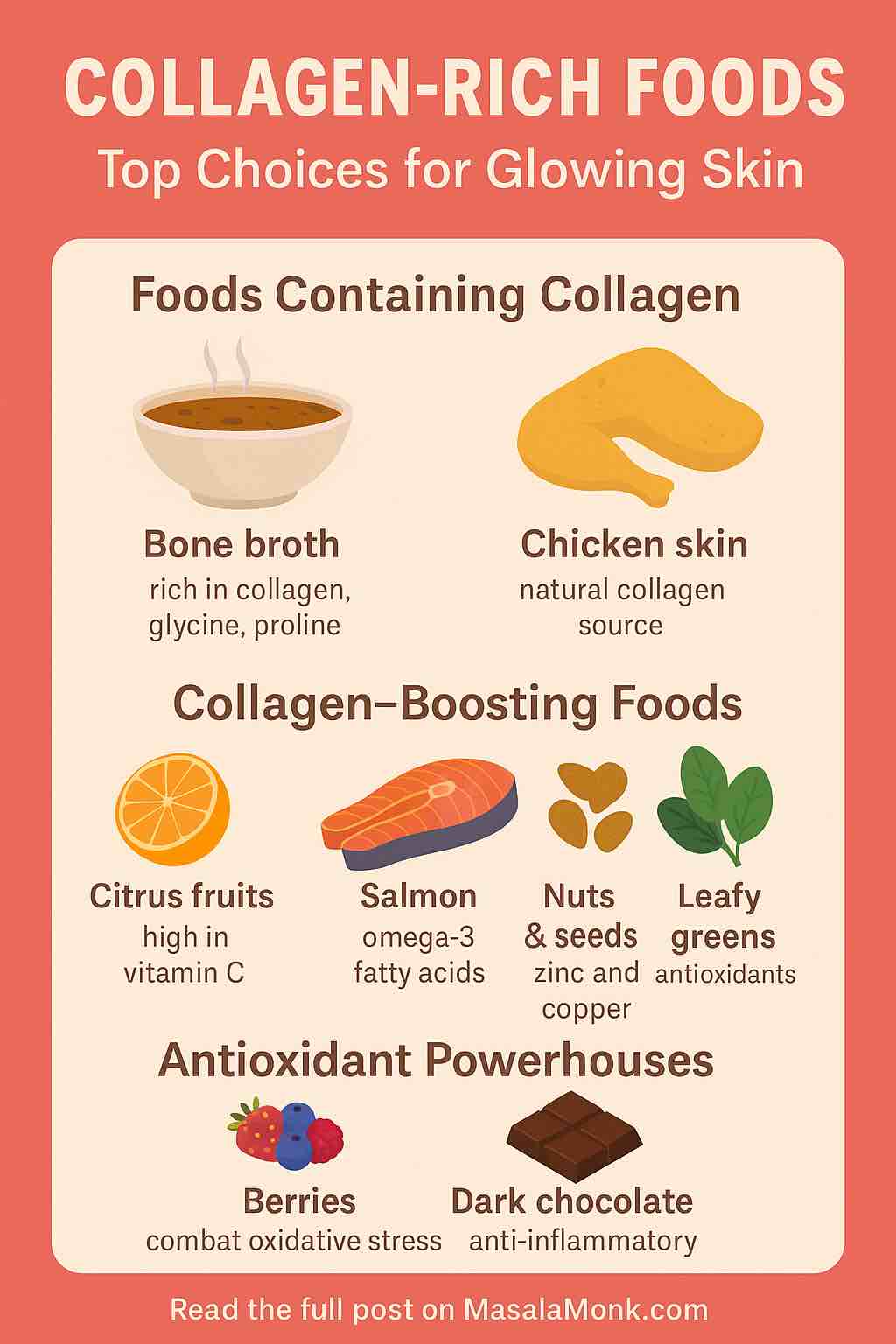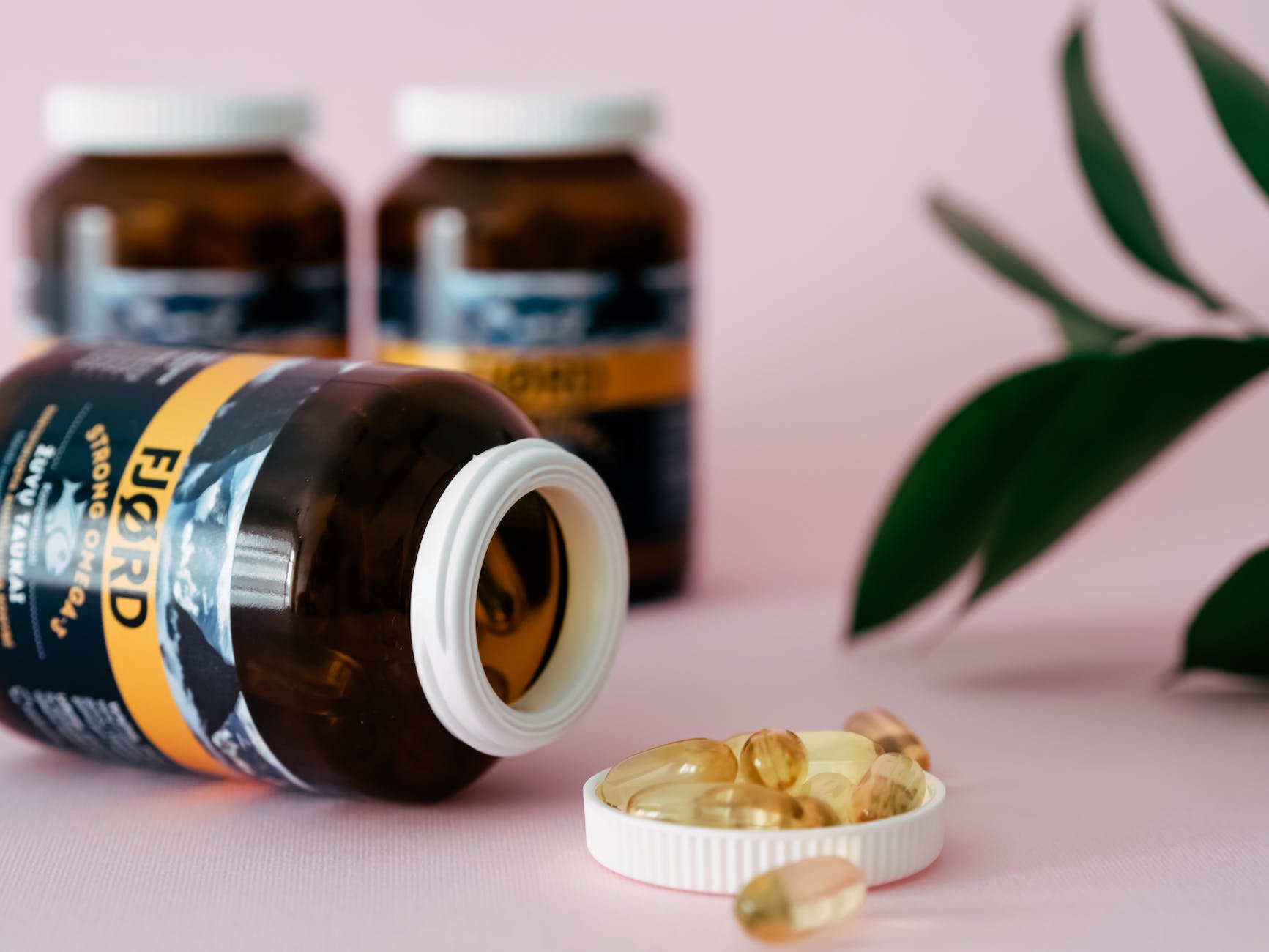
Do you want youthful, glowing skin without relying solely on pricey skincare products?
The secret might just lie on your plate. Collagen – the most abundant protein in your body – plays a crucial role in maintaining skin elasticity, hydration, and firmness. But did you know you can naturally boost your body’s collagen levels through food?
In this post, we’ll explore the best collagen-rich and collagen-boosting foods, how they benefit your skin, and how to incorporate them into your daily diet for radiant results.
✨ What Is Collagen and Why Is It Important for Skin?
Collagen is a structural protein that acts like the “glue” holding your skin, joints, and tissues together. As we age, collagen production naturally declines — leading to wrinkles, sagging, and dullness. Factors like sun exposure, sugar, stress, and smoking can further speed up this process.
That’s why eating collagen-rich and collagen-supportive foods is vital for maintaining skin health from the inside out.
🥣 Top Collagen-Rich Foods for Glowing Skin
1. Bone Broth
Rich in collagen, gelatin, glycine, and proline, bone broth is a skin superfood.
- Why it works: The simmering process extracts collagen from bones and connective tissues.
- How to use: Sip as a warm drink or use it as a base for soups and stews.
2. Chicken Skin and Meat with Connective Tissue
These parts of the chicken contain natural collagen.
- Why it works: Contains Type I and III collagen, essential for skin and elasticity.
- Tip: Roast chicken with the skin on for maximum benefit.
3. Fish Skin and Scales
Often overlooked, fish skin (especially salmon) is loaded with marine collagen.
- Why it works: Marine collagen is more bioavailable and easily absorbed.
- Pro tip: Enjoy grilled salmon with crispy skin or fish soups.
4. Egg Whites
Though they don’t contain collagen directly, they’re rich in proline — a key amino acid for collagen synthesis.
- Bonus: Also high in albumin, which supports skin tone and texture.
🥬 Foods That Boost Collagen Production
5. Citrus Fruits (Oranges, Lemons, Limes, Grapefruit)
High in vitamin C, which is essential for collagen synthesis.
- Why it works: Vitamin C acts as a co-factor in converting proline and lysine into collagen.
6. Berries (Strawberries, Blueberries, Raspberries)
Packed with antioxidants and vitamin C.
- Skin benefit: Protects collagen from free radical damage and supports new production.
7. Leafy Greens (Spinach, Kale, Swiss Chard)
Contain chlorophyll and antioxidants that protect against collagen degradation.
- Plus: High in vitamin C, iron, and magnesium.
8. Nuts and Seeds (Pumpkin Seeds, Sunflower Seeds, Walnuts)
Rich in zinc, copper, and healthy fats, all of which aid in collagen formation.
- Bonus: Improve skin barrier and hydration.
9. Tomatoes & Red Vegetables
Loaded with lycopene, a powerful antioxidant that supports collagen and protects against UV damage.
10. Garlic
Contains sulfur, which helps in collagen synthesis and prevents its breakdown.
- Tip: Use fresh garlic in your cooking, salads, and marinades.
☕ Trending Functional Foods for Collagen Boost
- Matcha Green Tea – Contains catechins that protect collagen from sun damage.
- Turmeric – Curcumin reduces inflammation and supports collagen stability.
- Dark Chocolate – Antioxidants improve circulation and hydration.
🧃 What About Collagen Supplements and Beauty Drinks?
Hydrolyzed collagen peptides, found in powders and drinks, have gained popularity. While studies show benefits for skin elasticity and hydration, they work best when combined with a nutrient-rich diet.
Avoid collagen supplements high in sugar or artificial additives – they can negate the benefits by increasing glycation, which damages collagen.
🍽️ Sample Day of Collagen-Friendly Eating
| Meal | What to Eat | Collagen Benefit |
|---|---|---|
| Breakfast | Berry smoothie with Greek yogurt & chia seeds | Vitamin C, protein, omega-3s |
| Lunch | Grilled salmon with quinoa and spinach salad | Marine collagen, zinc, antioxidants |
| Snack | Citrus fruit with a handful of almonds | Vitamin C + healthy fats |
| Dinner | Chicken bone broth soup with garlic and kale | Collagen, sulfur, vitamin C |
| Nightcap | Green tea or turmeric milk | Antioxidants and anti-inflammatory agents |
💡 Pro Tips to Protect Your Skin’s Collagen
- Hydrate generously – Water is vital for skin elasticity.
- Sleep well – Most collagen repair happens during deep sleep.
- Avoid smoking and limit alcohol – Both deplete collagen stores.
- Use sunscreen – UV rays are the #1 cause of collagen breakdown.
📌 Final Thoughts: Nourish Your Skin From Within
Collagen isn’t just a buzzword — it’s the foundation of youthful, glowing skin. While creams and serums can help, true skin transformation happens from within.
By embracing collagen-rich foods and adopting skin-supportive habits, you can boost your body’s natural glow — beautifully and sustainably.
FAQs
❓ 1. What is collagen, and why does my skin need it?
Answer: Collagen is a structural protein that gives your skin strength, elasticity, and hydration. As we age, collagen levels drop, leading to wrinkles and sagging. Consuming collagen-rich and collagen-boosting foods helps your body rebuild and maintain healthy, glowing skin.
❓ 2. Can I get enough collagen from food alone, or do I need supplements?
Answer: Many people can support healthy collagen levels through a balanced diet rich in bone broth, fish skin, and vitamin C-rich foods. Supplements can be helpful but should complement — not replace — whole foods.
❓ 3. Which foods naturally contain collagen?
Answer: Bone broth, chicken skin, fish skin, and animal connective tissues are top natural sources of collagen. These provide collagen types I, II, and III, which benefit skin, joints, and bones.
❓ 4. What vitamins and nutrients help your body produce collagen?
Answer: Vitamin C (from citrus and berries), zinc (from nuts and seeds), copper (from legumes and shellfish), and sulfur (from garlic and onions) are essential for collagen synthesis.
❓ 5. Are there vegetarian or vegan sources of collagen?
Answer: Collagen itself is animal-based, but vegans can boost collagen production with vitamin C-rich fruits, leafy greens, legumes, nuts, and seeds that provide the building blocks for natural collagen production.
❓ 6. How does sugar affect collagen levels?
Answer: Excess sugar leads to glycation, a process that damages collagen and elastin fibers, accelerating skin aging. Limiting sugar is key to preserving collagen and maintaining youthful skin.
❓ 7. Is marine collagen better than bovine collagen?
Answer: Marine collagen is more bioavailable and may be absorbed faster by the body, making it a good choice for skin health. However, both types offer skin benefits depending on individual preferences and dietary needs.
❓ 8. How long does it take to see results from eating collagen-rich foods?
Answer: Visible skin improvements may take 4–8 weeks of consistent intake. Collagen turnover is gradual, so maintaining a collagen-rich diet over time is essential for lasting results.
❓ 9. Are there any risks to consuming collagen daily?
Answer: Generally, collagen-rich foods are safe when consumed as part of a balanced diet. Those with allergies to fish or eggs should avoid certain sources. Always consult a healthcare provider before starting high-dose supplements.
❓ 10. What’s the best time of day to consume collagen for skin benefits?
Answer: There’s no “perfect” time, but many prefer taking collagen in the morning or before bed. Consistency matters more than timing — regular daily intake is key to seeing skin benefits.











